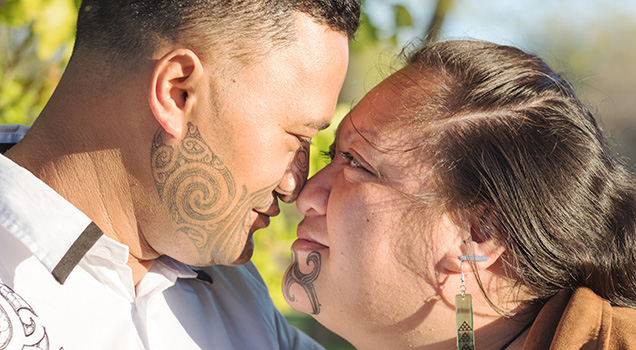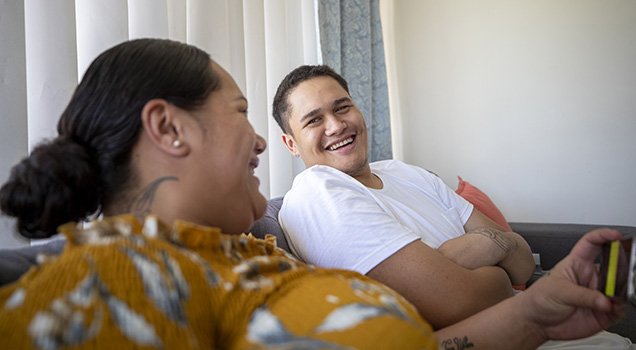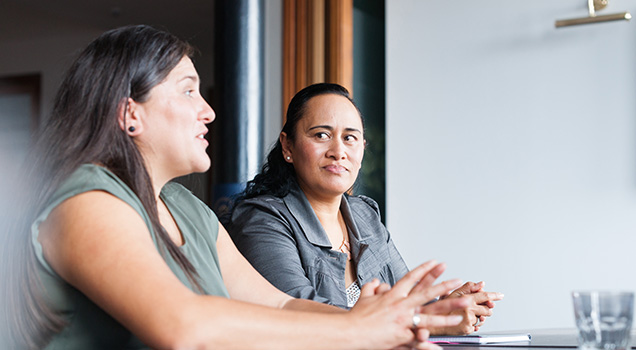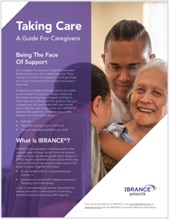HOW TO HELP
BE SPECIFIC IN THE WAYS YOU CAN HELP
If your loved one is living with cancer, the support of their friends and family is as important as the support of their healthcare team.
But asking for help or even talking about their cancer may be difficult. That’s why it's vital for you to be proactive and consider the best ways you can help them based on their needs.
Ways you can help:
- Cooking
- Cleaning
- Shopping
- Gardening
- Childcare
- Eldercare
- Petcare
- Sharing feelings with your loved one
- Be their support person at medical appointments
- Picking up children
- Going to the pharmacy
- Telling others how your loved one is doing
Being a support person can prove difficult at some stages. Download our Caregiver Guide below for tips that could help you in your role:
Caregiver Guide

FINDING THE RIGHT WORDS
When a loved one is diagnosed with cancer, it can be hard to find the right words.
They may be experiencing feelings of sadness, confusion and fear. It’s easy to make those feelings worse with intrusive questions, declarations of your own sadness or unsolicited advice. Instead, offer authentic words of support. Something like, "I'm so sorry to hear this news. Please know that I love you and I'm here for you" is a simple, straightforward way to be there for your friend or family member.
Follow Their Lead
Once you've reached out, let them set the tone. Everyone deals with cancer differently. You may have a friend who wants to continue living as normally as possible. So, chat with them about the same topics you would have before their diagnosis. Or you may have a family member who wants to share the intimate details of how they're feeling, discuss doctor visits and talk about fears. If that's the case, be a good listener and try to offer words of encouragement. Either way, let them lean on you in whatever way works for them. And remember, it's up to you to be the strong one in the relationship. Your feelings of confusion and sadness are valid but save those discussions for someone else. Someone living with cancer shouldn’t have to be a shoulder to cry on as well.
Keep the Communication Going
Reaching out once and then disappearing into your own busy life isn’t supportive. Someone living with cancer may feel isolated and alone, so regular check-ins by phone, text, handwritten notes and carefully arranged in-person visits remind them that you're thinking of them. Keeping up those offers of help and small gifts or flowers to brighten their day are great ways to maintain contact and support.
Please don’t be discouraged if you do not receive a response every time. Someone going through treatment may be too tired to respond or write a thank you note. But knowing they have the support of their friends and family go a long way in helping them during this difficult time.

OFFERING EMOTIONAL SUPPORT
Living with cancer brings challenges, both physical and emotional. The positive emotional support of friends and family can help your loved one’s wellbeing. These suggestions can start you off on the right foot.
Reach Out on a Regular Basis
It’s important to remember when a loved one is living with cancer; it is a constant reality for them. Rather than wait for the perfect time to sit down in person and have a heart-to-heart about how they're feeling, sending an encouraging text, an email with a great book recommendation, a handwritten card, or picking up the phone and calling them can be just as meaningful. These constant and consistent connections remind them you care, and may make a difference.
Follow Your Loved One's Lead
A cancer diagnosis is incredibly personal, so it's important to respect how your loved one is handling this life-changing development. Try not to be disheartened if your friend or family member doesn't want to share that many details. On the other hand, if they do want to share details, the best thing you can do is simply listen and offer your love and support. This isn't the time to share your own fears or tell stories about others you know living with cancer. If you're unsure how your loved one wants to communicate, a very simple "How are you today?" is a great way to open a discussion and let them lead the way from there.
Speak in Specifics
After you've opened the dialogue, one of the best things friends and family members can do for someone living with cancer is to offer tangible ways they can help. Instead of saying, "What can I do?"—which puts the burden on the person who's been diagnosed—offer specifics. For example, "I'd like to drive you to your next appointment, if that's helpful" or "I'd love to make dinner for you and your family. May I drop a meal by your house on Tuesday evening?". Those offers of specific help may ease the emotions that stem from feeling unable to do certain chores, and can be a thoughtful way to show you’re there for them.
Keep Being Inclusive
Someone living with cancer may not always have the energy to do the things they used to, but that doesn't mean you should stop inviting them. Keep them on your invitation list for dinner parties, your weekend coffee catch ups, and other activities you share together. If they're not feeling up to it, offer to modify or try something new. Whether it's bringing dinner to their house instead of going out, catching up on your favourite TV show together, or spending time with them while they rest, the important thing is to ensure you're still getting quality time and letting your loved one know you can support them in whatever way works best for them.

WAYS TO BE SUPPORTIVE IN THEIR EVERYDAY LIFE
There are lots of straightforward, practical ways to give your time when helping a friend or family member dealing with cancer. But sometimes, you want to do something unexpected—something that brings delight as well as a helping hand. Here are a few creative ideas to get you started:
Schedule a Coffee Date
Take them out for coffee or tea (and a yummy treat) and spend some time catching up in a relaxing environment. If they're not up for leaving the house, bring over the coffee and scones instead.
Take a Ride
If your loved one is able to leave the house, take them out for a drive on a sunny day. No agenda. No map. Just a drive to enjoy the scenery—even if it's a short one. If you're someplace warm, don't forget to roll the windows down and turn the music up!
Have Fun with the Little Ones
For parents living with cancer, making their little ones happy is one of the most helpful things you can do. Offer to take the kids on an outing to the movies, a local park or the zoo. Feeling creative? Bring over a box of chalk and encourage the kids to cover the driveway and footpath with pictures and messages.
Tackle Their Chores
If you're handy, you might help with home and garden maintenance, or repair household items. You could also offer to wash the car, pitch in with the washing or do some outdoor planting when the season arrives.

CONNECTING WITH OTHERS
Managing day-to-day life after a loved one has been diagnosed with cancer can be overwhelming for you and your loved one. Sharing and learning from others who are living through similar circumstances and can relate with some of your day-to-day challenges is important.
Other support persons understand what you are going through and can assure you that it’s ‘OK to feel what you are feeling’. Talking things over with othes may help provide you with some additional ideas for coping. It may also help you know you aren’t alone.

CARING FOR YOURSELF
Make time for yourself
You may feel that your needs aren’t important right now but taking time for yourself can help you be a better support person. Caring for your own needs and desires is crucial to give you strength to carry on.
- Find nice things you can do for yourself. Even just a few minutes can help.
- Be active. Walking, stretching, or dancing can make you less tired. Playing with kids or pets, or gardening are helpful too.
- Find ways to connect with friends. Are there places you can meet others who are close to you? Or can you chat or get support by phone or email?
- Give yourself more time off. Ask friends or family members to pitch in. Take time to rest.
- Do something for yourself each day. It doesn’t matter how small it is. Whatever you do, don’t neglect yourself.

QUESTIONS TO ASK THE DOCTOR
Accompanying your loved one to the doctor may be a great way for you to help. Sometimes, people living with cancer have trouble with medical visits. They may not understand everything the doctor says, or may forget some things.
- Write down questions you need to ask. Also write down things you want to tell the doctor.
- If you don’t understand an answer, ask the question in a different way.
- If you need to know more, ask.
- Let the doctor or nurse know what your worries are.
- Before you go home, make sure you know what the next steps are for your loved one’s care.
- Take notes. Or ask if you can record the visit.
- Let the doctor know if your loved one has had changes or new symptoms.
- Here are some helpful questions to ask:
- Are there ways my loved one can prepare for treatment?
- How long will the treatment take?
- Can he or she go to and from treatment alone?
- How can I help my loved one feel better during treatment?
- Can I be there during treatment?
- What are the side effects of the treatment?
- After treatment, what do we need to watch for? When should we call you?
- Also, ask about pain management. Many support persons say that they are afraid to ask about pain. They worry that it means the cancer is getting worse. Or some think that pain is normal, and their loved one just has to accept it. This is not true. People who have their pain managed can focus on healing. They can enjoy life more.

